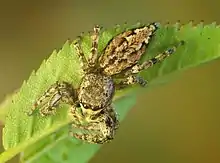Marpissa
Marpissa is a genus of jumping spiders that was first described by Carl Ludwig Koch in 1846.[5] The name is derived from Marpissa, an ancient Greek village.
| Marpissa | |
|---|---|
 | |
| Marpissa muscosa | |
| Scientific classification | |
| Domain: | Eukaryota |
| Kingdom: | Animalia |
| Phylum: | Arthropoda |
| Subphylum: | Chelicerata |
| Class: | Arachnida |
| Order: | Araneae |
| Infraorder: | Araneomorphae |
| Family: | Salticidae |
| Subfamily: | Salticinae |
| Genus: | Marpissa C. L. Koch, 1846[1] |
| Type species | |
| M. muscosa (Clerck, 1757) | |
| Species | |
|
51, see text | |
| Synonyms[1] | |
Species
As of June 2019 it contains fifty-one species, found in South America, Asia, Europe, the United States, Cameroon, on the Polynesian Islands, and the Greater Antilles:[1]
- M. agricola (Peckham & Peckham, 1894) – Brazil
- M. armifera Urquhart, 1892 – New Zealand
- M. balcanica (Kratochvíl, 1932) – Croatia
- M. bina (Hentz, 1846) – USA
- M. bryantae (Jones, 1945) – USA
- M. carinata Butt & Beg, 2000 – Pakistan
- M. dayapurensis Majumder, 2004 – India
- M. decorata Tikader, 1974 – India
- M. dentoides Barnes, 1958 – USA
- M. endenae Biswas & Biswas, 1992 – India
- M. formosa (Banks, 1892) – USA
- M. fornicis (Dyal, 1935) – Pakistan
- M. gangasagarensis Majumder, 2005 – India
- M. grata (Gertsch, 1936) – USA
- M. hieroglyphica Taczanowski, 1878 – Peru
- M. insignis Butt & Beg, 2000 – Pakistan
- M. kalapani Tikader, 1977 – India (Andaman Is.)
- M. kalighatensis Biswas & Biswas, 1992 – India
- M. lakshmikantapurensis Majumder, 2004 – India
- M. lineata (C. L. Koch, 1846) – USA
- M. linzhiensis Hu, 2001 – China
- M. longiuscula (Simon, 1871) – Ukraine
- M. manipuriensis Biswas & Biswas, 2004 – India
- M. mashibarai Baba, 2013 – Korea, Japan
- M. milleri (Peckham & Peckham, 1894) – Russia (Far East), China, Korea, Japan
- M. mirabilis Butt & Beg, 2000 – Pakistan
- M. mizoramensis Biswas & Biswas, 2007 – India
- M. muscosa (Clerck, 1757) (type) – Europe, Turkey, Caucasus, Russia (Europe to Central Asia), Japan
- M. mystacina Taczanowski, 1878 – Peru
- M. nitida Hu, 2001 – China
- M. nivoyi (Lucas, 1846) – Europe, Turkey, Caucasus, Iran, Russia (Europe) to Central Asia
- M. nutanae Biswas & Biswas, 1984 – India
- M. obtusa Barnes, 1958 – USA
- M. pauariensis Biswas & Roy, 2008 – India
- M. pikei (Peckham & Peckham, 1888) – USA, Cuba
- M. pomatia (Walckenaer, 1802) – Europe, Turkey, Caucasus, Russia (Europe to Far East), Central Asia, Afghanistan, China, Korea, Japan
- M. prathamae Biswas & Biswas, 1984 – India
- M. proszynskii Biswas & Begum, 1999 – Bangladesh
- M. pulla (Karsch, 1879) – Russia (Far East), China, Taiwan, Korea, Japan
- M. radiata (Grube, 1859) – Europe, Turkey, Caucasus, Russia (Europe to South Siberia), Kazakhstan
- M. raimondi Taczanowski, 1878 – Peru
- M. robusta (Banks, 1906) – USA
- M. rubriceps Mello-Leitão, 1922 – Brazil
- M. singhi Monga, Singh & Sadana, 1989 – India
- M. soricina (Thorell, 1899) – Cameroon
- M. sulcosa Barnes, 1958 – USA
- M. tenebrosa Butt & Beg, 2000 – Pakistan
- M. tigrina Tikader, 1965 – India
- M. tikaderi Biswas, 1984 – India
- M. yawatai Baba, 2013 – Japan
- M. zaitzevi Mcheidze, 1997 – Georgia
References
- Gloor, Daniel; Nentwig, Wolfgang; Blick, Theo; Kropf, Christian (2019). "Gen. Marpissa C. L. Koch, 1846". World Spider Catalog Version 20.0. Natural History Museum Bern. doi:10.24436/2. Retrieved 2019-07-19.
- Barnes, R. D. (1958). "North American jumping spiders of the subfamily Marpissinae (Araneae, Salticidae)". American Museum Novitates (1867): 3.
- Yaginuma, T. (1955). "Revision of scientific names of Japanese spiders". Atypus. 8: 14.
- Logunov, D. V. (2009). "On Roeweriella balcanica, a mysterious species of Marpissa from the Balkan Peninsula (Araneae, Salticidae)". Arachnologische Mitteilungen. 37: 9. doi:10.5431/aramit3702.
- Koch, C. L. (1846). Die Arachniden. J. L. Lotzbeck, Nürnberg, Dreizehnter Band, pp. , Vierzehnter Band, pp. 1-88. pp. 1–234.
External links
This article is issued from Wikipedia. The text is licensed under Creative Commons - Attribution - Sharealike. Additional terms may apply for the media files.